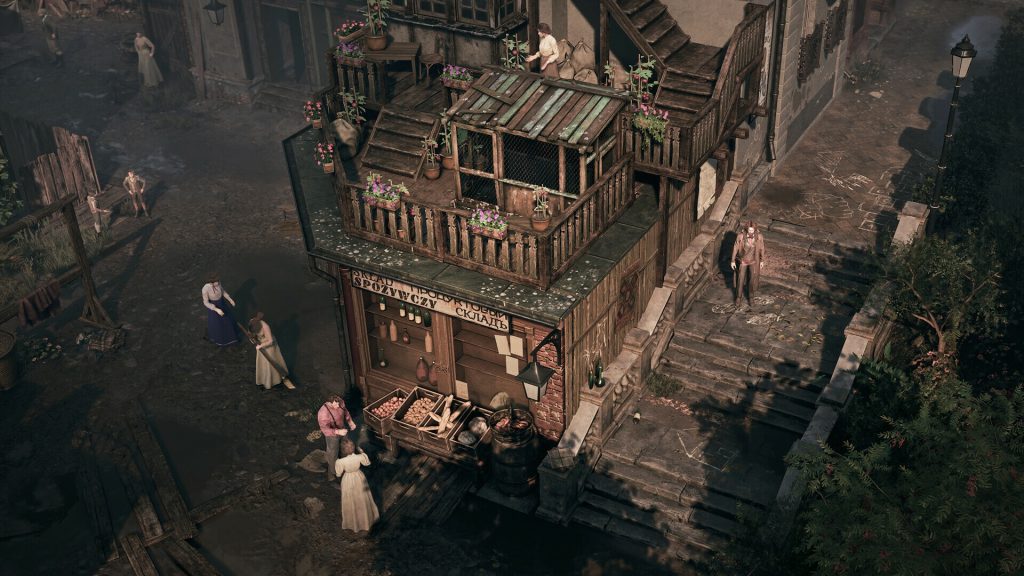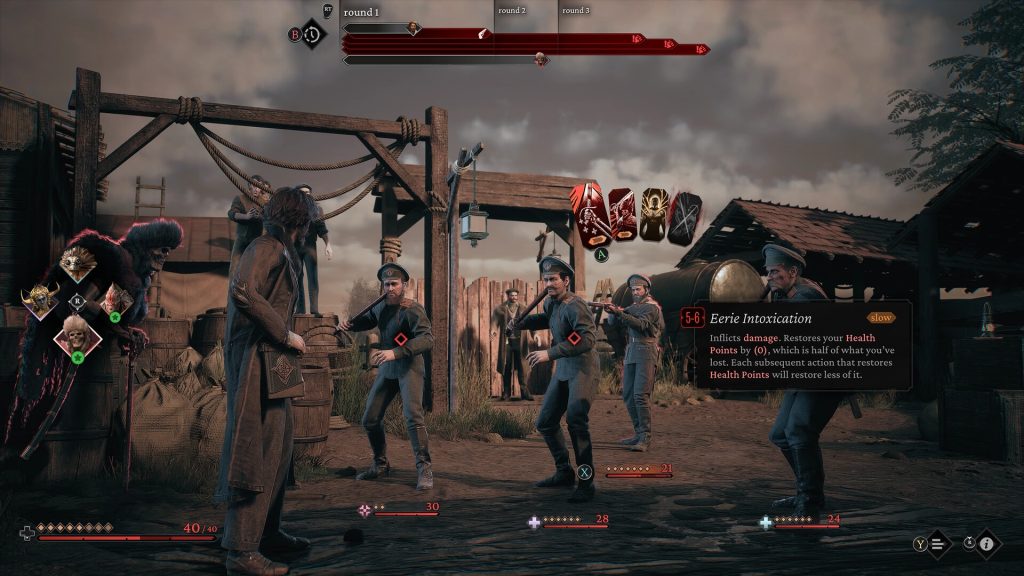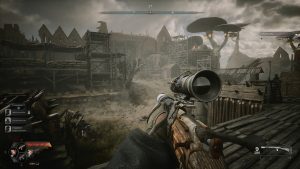
If there’s one thing, we know about the early 1900s, it’s that it was an incredibly bleak time just about everywhere you looked. Much of the world was trying to build up its economy but at the same time workers’ rights were just about non-existent, and worst of all, war was looming over everyone’s heads because of the political situation in much of Europe. This is the world that The Thaumaturge puts us in, except it also throws in some magical monsters in the mix in the city of Warsaw.
To describe The Thaumaturge using only regular genre terms is a complicated endeavor, since the title tends to mix and match so many different ideas that you wouldn’t really expect would go together particularly well. More than anything, however, The Thaumaturge is a narrative RPG, with a turn-based combat system thrown in for good measure. However, you don’t really fight that often in this game. Rather, most of your time will be spent in investigating your surroundings, trying to solve mysteries, figure out the political landscape of Warsaw, and along the way, maybe convince a few monsters to work with you rather than against you.
Before we get to all of that, however, it’s important to talk about just how seriously The Thaumaturge takes its presentation. When it comes to minute-to-minute gameplay, the game can look downright gorgeous at moments. While it goes without saying that the primary setting of Warsaw is wonderfully detailed, especially when you start paying attention to some of the finer aspects of architecture, like the gorgeous building facades and even the village that acts as the game’s tutorial has a similar level of detail crammed into just about every corner. However, the game doesn’t allow you to control the camera. The game will decide the best angle according to the situation, and, T=thankfully, the camera never gets in the way of gameplay.
"The Thaumaturge nails it on most counts on both the audio and visual front"
Along with the visual presentation, the game also features an excellent soundscape. The hustle and bustle of Warsaw’s train station is predictably dense, giving the sense that they are in constant use by commuters of all kinds. Going into the more industrial areas of the city also similarly fills the atmosphere with the clanging and banging of factory workers, and crowd noises of the revolutionaries trying to get the oppressed workers to rise up against inhumane working conditions. When it comes to presentation, The Thaumaturge nails it on most counts on both the audio and visual front, and this carries over into the voice acting as well.
Characters are expressive and their accents have been executed well enough that the game makes you believe that they grew up in the area where you meet them. The only real downside here is that the animations for characters while speaking is not very well implemented. While far from a deal breaker, characters talking to each other often feels incredibly janky, and the generally slow speed at which they tend to say every line makes the “Skip Dialog” button a gift for those of us that can read the subtitles faster than the characters can say their dialougues.
Aside from the overall presentation, the two main stars of The Thaumaturge are its story and its unique combat system. The story revolves around the eponymous thaumaturge Wiktor Szulski, who is empowered with the ability to control demonic entities, known in the setting as salutors. These salutors each have unique abilities, strengths, weaknesses, and awesome designs. After going through the game’s opening and learning of his own father’s death, Wiktor sets out on a journey of self-discovery and mystery-solving. A lot of the story in The Thaumaturge revolves around historical events of the time, with the emphasis on an oncoming revolt of the working class against their wealthy bosses.
As is the case with any brewing revolt, there are several factions at play, and this is where the role-playing aspect of The Thaumaturge comes into play. There are several points throughout the game where Wiktor has to make choices, be it minor ones like how you’re going to convince a particularly antagonistic guard to get out of your way, to bigger choices, like maybe turning in a woman that’s seemingly hiding ammunition to the local police or helping her out and uncovering something much larger at play. The factions aren’t really present as much of a mechanic as they are as branching paths in the game’s story. You’re not going to get to grind out reputation with certain factions, for instance. Rather, you’re going to make choices that define whether a faction’s goals happen to align with yours, thus opening and closing different branches of the story.
This implementation of factions is quite interesting, since it manages to avoid adding unnecessary complications to the core mechanics of the game. You’re instead encouraged to really put yourself in Wiktor’s shoes, and think about how he would tackle any given situation.

"There are several points throughout the game where Wiktor has to make choices"
The Thaumaturge has this incredibly interesting turn-based combat system, but there just isn’t enough fighting in the game. When you get into a fight, you are presented with a time-table of sorts, letting you know when your opponents are going to use abilities or attack. On your turn, you can execute a single action per unit, in the early game this means that Wiktor gets one attack, and his salutor gets one. While your attacks start out pretty simple, be it a quick jab or a high-damage long-winded punch, soon enough, you get to modify your abilities with passive bonuses. I fell in love with combining the jab with a 50 percent chance to interrupt an opponent’s planned attack, which started letting me drown that one opponent in a barrage of attacks before he could finally land one of his own.
Along with regular attacks, there are also statuses at play. While most of these largely boil down to fancier implementations of a damage-over-time effect, one notable status, achieved by reducing a target’s focus, lets Wiktor go all-out with a high-damage attack that might even have some interesting bonuses attached. The salutor can similarly use a fancy attack of their own, with different salutors having different effects with their attacks. For example, one of them can heal Wiktor for half the damage he deals to an enemy.
Outside of the combat, the gameplay revolves around mostly just going around, talking with a bunch of people, and investigating weird things on the ground. Since The Thaumaturge is largely about solving mysteries, a core mechanic in the game is finding clues that connect with each other, ultimately leading you to the answer for whatever mystery you might be solving. For the sake of keeping things spoiler-free, let us take an example from the prologue. A salutor is haunting the village, feeding into the villagers’ negative emotions. By looking into the time frame around which this change in the villagers’ behavior started, and by observing certain pointers that pertain to a particularly scared and irritable lady, Wiktor ultimately finds himself in his first boss fight. Ultimately, this investigative aspect doesn’t really rely on the player connecting the dots themselves. Instead, it acts as a sort of breadcrumb method to tell smaller stories in the larger world, making it a much more interesting approach to investigative gameplay than throwing up a big board where you’re connecting different clues and what not.

"There just isn’t enough fighting in the game."
Generally speaking, The Thaumaturge is an incredibly interesting game. It looks and sounds fantastic (as long as you are okay with bad NPC animations when they speak), and its turn-based combat system is one of the most interesting ones out there that still manages to keep things surprisingly simple. The writing in The Thaumaturge is also quite intriguing, especially for those among us who might be interested in a historic setting, and wondering how supernatural elements can fit into a world on the brink of uprising and chaos.
This game was reviewed on PC.
Interesting story; Really fun combat; Cool salutor designs.
Character animations can feel janky at times; Not enough combat
















